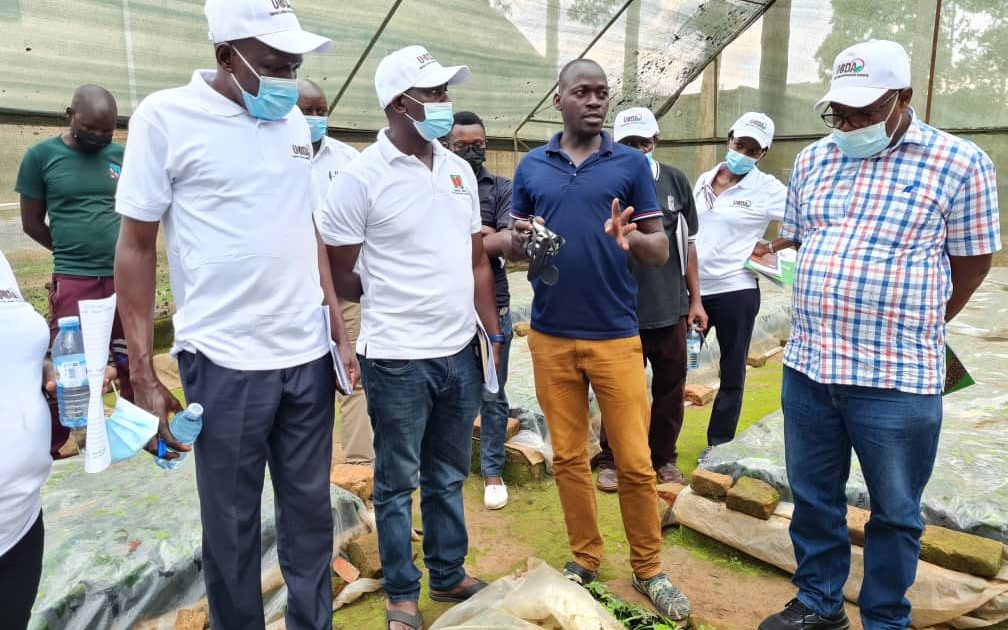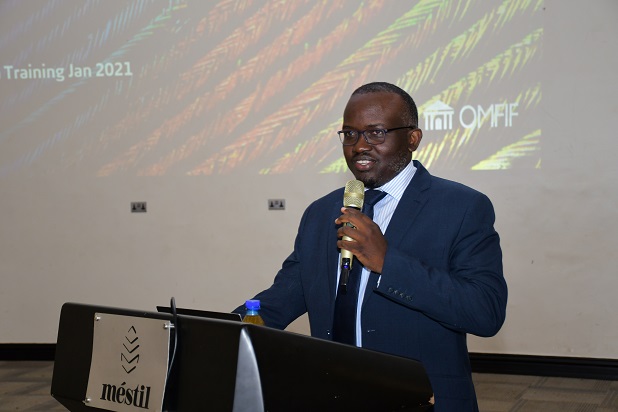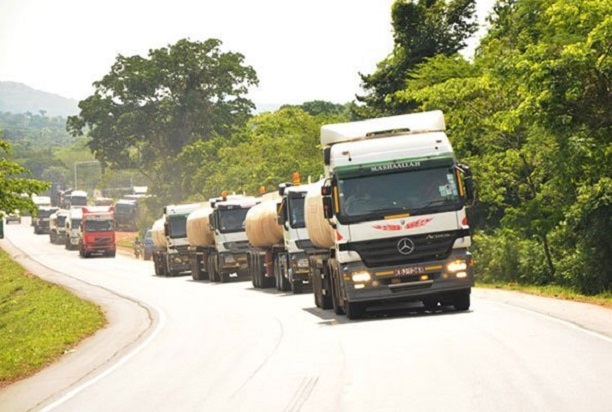UCDA Board Chairman Dr. Charles Francis Mugoya (Right) and Board Member Dr. Sadik Kasiim (Left) listening to an official from Royal Plants and Nurseries
The Board of Directors of Uganda Coffee Development Authority (UCDA) is in the Rwenzori region to appraise and evaluate the performance of the Authority’s field activities.
The UCDA Board of Directors is industry-based and is a practical demonstration of public-private partnership with representation from Government and the private sector representing coffee value chain actors.
On Tuesday March 08, 2022, the UCDA Board members led by their Chairman Dr. Charles Francis Mugoya started off the day by visiting Royal Plants and Nurseries Limited based in Kyenjonjo district.
Other UCDA Board members include Michael Nuwagaba (coffee processors representative), John Nuwagaba (coffee farmers representative), Martha Nalubega Wandera (coffee roasters representative) and Connie Masaba Magomu (MAAIF representative), Fred Luzinda-Mukasa (coffee exporters representative), Dr. Sadik Kasiim (NARO representative), Maris Wanyera (Ministry of Finance, Planning and Economic Development representative), and Richard Okot Okello (Ministry of Trade, Industry and Cooperatives representative).
These were joined by UCDA top management led by the Managing Director Dr. Emmanuel Iyamulemye.
Narcis Tumushabe Rwangongo, a Director at Royal Plants and Nurseries informed the team that they are the leading suppliers of CWD-r plantlets in the region.
He added that in the last seven years, they have supplied more than 1.2m CWD-r plantlets to nursery operators and farmers mainly in the Rwenzori region.
He further highlighted the challenges they are facing including the high investment costs against what he termed as “exceptionally long gestation period (of over two years).
He said sometimes nursery operators over produce plantlets and the Government through UCDA ends up buying a few, thus leading to losses. He asked the team to ensure that nursery operators get timely information on the number of plantlets they are expected to raise/produce in a particular season.
“Sometimes we have plantlets ready for consumption (planting) but demand is limited. We are not sure of the market; we don’t know whether what we have produced will be absorbed,” Tumushabe said.
In response, Dr. Charles Mugoya, the UCDA Board Chairman, said the coffee Authority recognizes the role nursery operators play along the coffee value chain.
“The coffee story begins with nursery operators. Quality starts from here; if the product (plantlets/seedlings) is bad, the bean and flavour will be poor,” Mugoya said, commending Royal Plants & Nurseries for doing the best they can to improve and maintain quality.
He pledged UCDA’s support to Royal plants and other nursery operators.
“We pledge to work with you and support you with forecasting. We are working on providing you with information in a timely manner to guide you plan better,” he said.
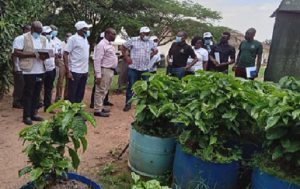
After visiting Royal Plants and Nurseries, the team headed to Clarke Farm that is located in Katambale village, Kyembogo Sub-County, Kenjonjo district. Owned by Dr. Ian Clarke, the farm was founded in 2015 and sits on 1500 hectares of land, with coffee currently occupying 690 acres.
Clarke Farm also operates a wet mill and works with about 1,000 out-growers from the neighbouring villages. They have a certified nursery bed and provide plantlets to out-growers at agreed terms and conditions.
The huge model farm is also engaged in eucalyptus (450 acres), macadamia and maize growing (they planted 200 acres last season).
The farm has phased out the poultry project (layers) after their assessment showed that the enterprise wasn’t performing as expected. They are also in the process of phasing out the banana/matooke project after performing poorly.
Recently, a coffee lodge was launched at the farm with the aim of promoting coffee tourism.
Why Board is in the field
In an exclusive interview with Business Focus at the sidelines of the visit, the UCDA Board Chairman, Dr. Charles Francis Mugoya, said they are a practical board, the reason why they are visiting selected farmers and farms considered to be “exemplary with good systems for growing coffee.”
He added that whereas the board knows some of the challenges farmers are facing, “sometimes it is good to visit farmers and confirm that they are real and need support in order to succeed.”
He revealed that new Board of Directors which was inaugurated by the Minister for Agriculture, Frank Tumwebaze on October28, 2021, in accordance to the National Coffee Act, 2021, will follow the Coffee Roadmap and all the necessary requirements that need to be undertaken to drive the coffee sub-sector forward as Uganda aims to produce 20m 60kg-bags of coffee by 2025.
He said the board will continue visiting farmers and other stakeholders along the coffee value chain across the country.
“There are many progressive farmers and many initiatives which have started. We are going to see more similar engagements,” he said.
He urged Ugandans to continue planting coffee, saying that it’s profitable and worth it.
“Coffee is a commodity crop which can give the highest income per acre if it is well done among all the crops that we have. I encourage farmers to invest in coffee. It’s a tree, so it doesn’t have so many challenges that other crops face. It is easy to maintain once it has started producing,” he said.
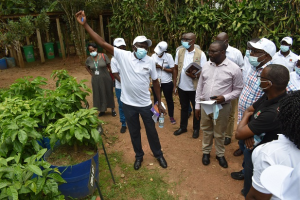
Connie Masaba Magomu, a board member on UCDA Board representing MAAIF, said being a new board, going to the field gives them an opportunity to interact with the stakeholders in the sector so that they can understand their challenges and opportunities that exist in the coffee sector.
“Coffee is an important crop for the country and we can’t afford to be a boardroom Board. This is an opportunity to be practical and interact with players on what they are going through,” she said.
Asked on what motivated the Board to go to the field, Dr. Sadik Kasiim (NARO representative), said that they wanted to track and pursue the coffee roadmap that aims to increase coffee production and productivity.
“We want to ensure that there’s continuous increase in coffee production and productivity and that what we produce is of high quality that eventually we can be able to add value to,” Kasiim said, adding that this will be key in sustaining the market needs and demands.
“To achieve this, we wanted to know the ongoing efforts in the field especially towards production and productivity,” he said, adding that the outcome and recommendations from the field visits “will inform our decision on investments of UCDA in the sector.”
Commenting on the experience from the field so far, Kasiim said: “So far I am very impressed with the nurseries, the mother gardens and the set out of nurseries to ensure farm hygiene in terms of disease transmission to the other farms.”
In reference to Clarke Farm, he said: “I am happy with the linkage of these farms with the out-grower farmers because the focus is that a big farm should act like a nucleus farm. They should be able to provide services to other farmers such as access to quality planting materials and access to market and subsequently value addition. The nucleus farm should be able to offer those services.”

He added that the Board wants to ensure that UCDA builds resilience of stakeholders, especially farmers to produce coffee.
“Resilience means observing all agronomic practices that are taught, especially responding to climate change effects… We should also be going for coffee wilt resistant varieties and doing integrated pest and disease management practices,” he said, noting that this will ensure that coffee plantations are sustainable.
“Above all, we should stick to quality standards that are required in the local and export market if we are to stand the test of time,” he urged all coffee stakeholders.


